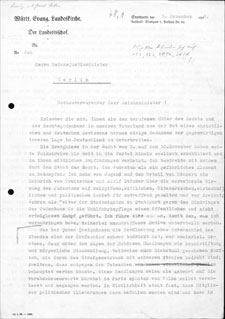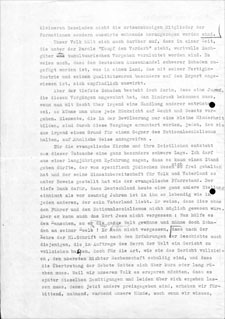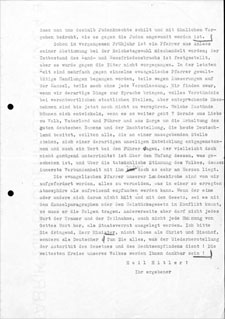Protest against the November Pogrom
Theophil Wurm had been shaped by the omnipresent anti-Judaism in German Protestantism. Ever since having visited him in Berlin on a study trip in 1893, Wurm also shared Adolf Stoecker’s rejection of modern, emancipated Judaism. Wurm was convinced that Judaism had undue influence in Germany and therefore welcomed the state’s measures to constrain it.
Wurm was, however, unable to accept that despotism, violence and lawlessness determined the course of action. He alone therefore supported Wilhelm von Pechmann, who had called upon the German Evangelical Church committee in 1933, to protest to the Reich government against the boycott actions of April 1. Wurm remained silent, though, when the Jews were made second class citizens in 1935.
Wurm did not approach Reich Minister of Justice Franz Gürtner until 1938 when synagogues were burned. In his letter, he stressed his belief from his youth onward in the subversive effect of Judaism on the religious, moral, literary, economic and political spheres. Yet, he averred, the destruction of the synagogues had emotionally shocked broad segments of the nation as far as the party.
Wurm complained that things had happened under the eyes of the authorities, which were threatened with severe punishments by the criminal code. He found such a course of action intolerable precisely in view of National Socialism’s successes – and also in view of young people. Wurm confronted the minister with the Bible’s claim and asked him to do everything conducive to restoring the authority of law and the sense of justice.
Wurm did not go public with his criticism; he confined himself to fulfilling the church’s office of a guardian by speaking seriously with the authorities instituted by God. He showed understanding for the actions that constrained Judaism’s supposedly undue influence. Nevertheless, he felt that, even though the Protestant church shared the state’s concern, resolute protest had to be lodged against any type of action not in keeping with a constitutional state.
Source / title
- © Landeskirchliches Archiv Stuttgart, D1/78



